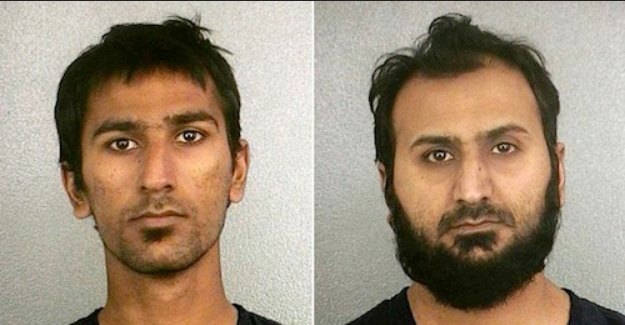


12/20/2012

A recent case of an attempted jihadist terror attack began to be revealed in a New York City courtroom on Tuesday when Raees Alam Qazi, 20, appeared for a bail hearing. Qazi, along with his older brother Sheheryar Alam, 30, were charged with planning to bomb New York City in a crowded area in order to kill lots of Americans.
The brothers were motivated by a desire for revenge because of American drone attacks on their native Pakistan. The younger brother at least attended American schools after the family immigrated to this country, but apparently they remained loyal to their tribe and religion to the point of wanting to murder the people who welcomed them.
Why does Washington continue to admit likely enemies as immigrants? Are the suits not paying attention, or do they think a few terrorist murders are the necessary cost of adding the diversity America needs?
Prosecutors: Fla. man planned NY bombing, New York Daily News, December 18, 2012
Raees Alam Qazi wanted to blow up a New York City landmark, prosecutors alleged, but he lacked the resources to carry out the plan.
FORT LAUDERDALE, Fla. — A Pakistani-born man wanted to avenge the deaths of U.S. drone attacks in Afghanistan by blowing up a New York City landmark but lacked the money and materials to carry out the plan, a federal prosecutor said Tuesday.
Assistant U.S. Attorney Karen Gilbert said at a bail hearing that Raees Alam Qazi, 20, researched bomb-making techniques on Internet sites affiliated with al-Qaida, including one using Christmas tree lights, and the FBI recorded phone calls and conversations linking Qazi to a purported “lone wolf” plot.
“He fully intended to do this, and thankfully he didn’t have enough money,” Gilbert said. Referring to casualties in U.S. drone attacks, she added: “He wants to avenge those deaths and kill people.”
Qazi traveled to New York last month in hopes of getting a job to fund his terrorist plans, Gilbert said, but wound up sleeping in public transportation, a mosque and in restaurants, and riding a bicycle around the city looking for potential targets. He then decided to return home on a Greyhound bus and was arrested after arriving back in South Florida, she said.
Qazi, a naturalized U.S. citizen who attended local Florida public schools, confirmed many elements of the plot in a statement to FBI agents after his arrest in late November, Gilbert said. Investigators also found bomb-making and related components at the Qazi family home in Oakland Park, as well as explosives research evidence on a computer used by Qazi.
Qazi is charged along with his brother, 30-year-old taxi driver Sheheryar Alam Qazi, with conspiring to provide material support to terrorists and with attempting to use a weapon of mass destruction in the U.S. Both have pleaded not guilty to the charges, which carry a potential life sentence if the men are convicted of both counts.
U.S. Magistrate Judge William Matthewman ordered Raees Qazi held without bail until trial, finding that he is a danger to the community and a flight risk. His older brother has already agreed to pretrial detention, but may seek bail later. A trial is likely many months away.
Gilbert said Raees Qazi was the intended operative, using either a suicide attack or a remote-control device to kill people in a crowded place such as New York’s Times Square, a Broadway theater or perhaps on Wall Street. The elder Qazi supported his brother financially and logistically with the knowledge that Raees was planning a terror attack, the prosecutor said.
In one conversation recorded by the FBI, Sheheryar Qazi compared his brother to a “lone wolf, like the Times Square bomber.” Gilbert said Sheheryar Qazi was referring to Faisal Shahzad, who unsuccessfully attempted to detonate a bomb at the New York landmark in May 2010. In another recorded conversation, Sheheryar Qazi says that his brother “wasn’t going to be in this world long.”
Raees Qazi’s attorney, Daniel Ecarius, tried to persuade the judge to allow his release on bail, noting that Qazi had made money by selling bicycles on the Internet, had no criminal past and had already relinquished his passport. Ecarius suggested Qazi could be released on house arrest with electronic monitoring, but Gilbert urged the judge to keep him locked up.
“He wanted to carry out an attack. If he is released from custody, he will,” she said.